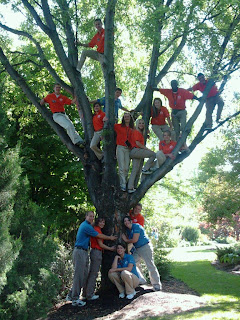Broadening our definition of "normal"
So, I am going to post about my job again. I just have been reflecting on the past school year. I have worked in my job for almost a year! The school year ended and some of the kids promoted. It was really sad. I don't like thinking about how they promoted and won't be there next year. The classroom will feel somewhat empty without them there. Over the past year, I have learned so much from these kidos. I have learned about love, laughter, intelligence, learning processes, behavior discipline, reinforcement...I could go on forever. I think the most important thing I have learned about is the definition of normal and "cool".


These kids are not "normal". They are autistic. They have special needs. They have annoying behaviors, aggressive tantrums, loud tantrums, non-compliance issues. They sometimes have OCD. They sometimes throw tantrums because things aren't going there way or because something is too hard. People look at the kids and think they are strange. They think that they are dumb. They think they are incapable of becoming anything of worth. It is heart breaking to see how people sometimes react to these kids because they don't fit what society thinks as normal.
My main question of this blog is what is normal?
We could make this long list of what makes people normal. I don't know how we can make this list of normal behavior. In one of my psychology classes, we talked about how society creates a standard of behavior that is considered acceptable. Normal people act within the society accepted behavior and abnormalities come when someone acts deviant to the society created standards. If we follow this definition, then autistic children definitely are "abnormal". They don't even notice what the crowd is doing because they are in their own little world. Sometimes they acknowledge that they are different, but most of the time they are unaware of their differences. In their eyes, they are normal because that is all they know.
My first day of working in my classroom, I felt very uncomfortable. I had never worked in a classroom with kids who had autism. All I knew was I was getting paid for working in a classroom with moderate to severe disabilities. I felt like I was in a mad house. I started subbing long term since there was no one in my position. I came home so exhausted. I was so tired from these kids behaviors. Over time, I began to understand them and it became less intimidating. Their "abnormalities" became normal to me, as I began to understand their world. Now, their "abnormalities" are normal to me. When new people come in to work in the classroom, they say something about a behavior that is odd. It dosen't even phase me even more.
I'm not expecting everyone to work in a classroom like me and interact with autistic kids everyday. When I first starting working, I noticed that not every personality could work with these kids and enjoy it. Even if you can't handle working in special education, it dosen't mean you can't be loving and accepting. I am just saying that we maybe we should broaden our definition of normal a little bit and start accepting people who are outside of our definition of normal. Most people look at people who don't fit our definition and rule them out because they are weird. Stop doing that. Instead of excluding them out, try to see from their point of view. You don't need to be their best friend. Just give them a chance and not judge them from your first interaction. When you show kindness and acceptableness to these kids, they will show you the same. Open up your heart and expect for a lot of love coming your way. They may not show gratitude through words, but their actions show that they appreciate your love.
Entering the world of special education has definitely changed my life for the better. I have developed close relationships with my co-workers as we have struggled so much in the last school year. It had a rough beginning but we supported each other as a team. We never gave up on each other or the students. Without my co-workers, I wouldn't of survived this last year. From the challenges of having no curriculum, students behaviors and helping students meet their IEP goals, I have learned the challenges and rewards of special education. I have learned that I am a advocate for these students. They need more support and it isn't freely given. As a educator, you have to fight for support for the special education program. I have seen so many improvements in our program. It has been amazing to see where we started and where we are now. It's amazing to meet the families of these students and see how much love there is in the families. The parents would do anything for their kids. The kids love their parents.
So for those who are not familiar with special education or autism, try to broaden your definition of "normal" and not initially judge these kids as stupid. Whenever you see a special needs child, try to show a little more compassion. The parents, friends and educators of these students would greatly appreciate that.
Want a little insight?


Comments
Post a Comment